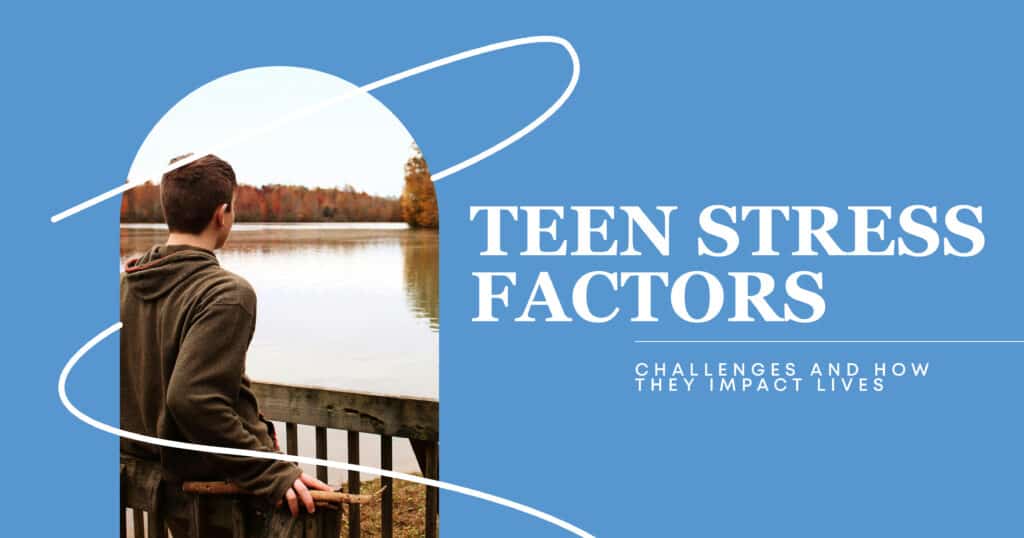Being an adolescent is a critical time in every person’s life. It is a time when a young person begins to define their identity, engage in relationships, negotiate sometimes complex interactions, and assume greater responsibilities. It is an engine of success but also a stressful situation.
Teenage stress factors are important for equipping teens with the right mechanisms to build resilience during this critical transition stage. Let’s identify the causes of teenage stress, their manifestations, and how they can be effectively managed.
Understanding What Makes Teen Stress Special
Stress in adolescents is not the same as in adults or younger children. Adolescence is a period when young people learn to deal with many different aspects of life, such as emotions, relationships, and expectations. All the fast changes during this period in terms of physical, emotional, and cognitive transformations make adolescents more prone to stress at every moment.
What Sets Teen Stress Apart?
Developing Brain | The maturation of the prefrontal cortex, which is responsible for making decisions and impulse control, is still in process, making it harder for teenagers to manage stress well. |
| Emotional Intensity | The hormonal changes heighten their emotions and amplify the stress that they experience. |
External Pressures | The academic stressors and social media stress a teen has had different effects on a generation that did not experience them. |
| Lack of Coping Mechanisms | Without life experience, teens often struggle to manage stress in adolescence and may resort to unhealthy coping strategies. |
By understanding these characteristics, parents, educators, and caregivers can better support teens navigating the complexities of growing up.
What Causes Stress in Teens?
Causes of teenage stress require identification before the possibility that therapy can be effective. These often come from internal and external sources, many of which relate to the adolescent experience.
Academic Pressure
The pressure to perform well in school is one of the most significant teen stress factors. Students often feel overwhelmed by the need to excel in exams, maintain high grades, and meet college admission requirements.
- High School stress could peak during exam periods or even bouts of juggling multiple deadlines.
- High expectations from parents and teachers only add to the burden or lead to burnout.
Social Media and Peer Pressure
The digital age has brought new challenges for teens. Social media platforms often act as amplifiers for teenage anxiety triggers, creating a constant need for validation.
- Feelings of inferiority emanate from comparing oneself to the primarily curated, often unreal, personas on the Web.
- Another major adolescent stressful component is cyberbullying, and it causes emotional disturbance in many teens.
Family Dynamics
Family relationships can also be a source of everyday teen stressors.
- Conflict at home, whether between parents or siblings, can affect a teen’s emotional well-being.
- High expectations from family members can add to the pressure.
Peer Relationships
Navigating friendships and romantic relationships during adolescence is often challenging.
- Bullying or feeling isolated can affect a lot of people. It often gives rise to mental issues as well as stress and can lead to anxiety.
- The yearning to fit in peer expectations is a constant source of stress in adolescence.
Future Uncertainty
The transition to adulthood brings uncertainty, which can be overwhelming for teens.
- Decisions for college, career, and financial independence are most often associated with teenage anxiety triggers.
- They fear that they will fail or make the wrong choice.
Recognize the Signs
Stress doesn’t always look the same in everyone, but recognizing the signs of stress in teens can help prevent it from escalating into more serious teen mental health challenges.
Behavioral Signs of Stress
- Avoiding social interactions or withdrawing from friends and family.
- Changes in academic performance, such as declining grades or procrastination.
- Increased irritability, anger, or frequent emotional outbursts.
Physical Symptoms
- Persistent headaches, stomach pains, or unknown fatigues.
- Change in sleeping arrangements, like sleeplessness or too much sleep.
- Modification in eating patterns, either by consuming too much or not eating at all.
Emotional Indicators
- Feelings of hopelessness or worrying excessively about everything.
- Have trouble paying attention or staying focused.
- Intense feeling of being overwhelmed or unable to cope with everything.
By identifying these signs early, parents and caregivers can intervene to support teens before stress leads to long-term issues.
Stress and Depression
Chronic stress has a significant effect on the mental health of an adolescent as it often provides a pathway to depression among adolescents. The relationship between stress in adolescence and depression has come into focus in many studies, indicating an urgent need to recognize and cope with this growing stress that may escalate into a more serious occurrence in mental health.
How Stress Contributes to Depression
- Prolonged Exposure to Stress
Teens who make continuous stress from school pressure, family changes, or bad friendships into a habit are more prone to the development of depression. Continuous stress creates a helpless feeling that inhibits how a teen perceives their way out of their situation.
- Development of Negative Thought Patterns
Stress can change the self-image of teens and even the image of the world around them. They may even internalize failures or setbacks, creating odd views about their self-esteem or competencies. In the long run, these thought patterns may later deepen sad feelings and even lead to the onset of depression.
- Social Isolation
Teenagers usually retreat from their friends, families, and non-academic activities when stressed out. This worsens their feeling of loneliness, which increases the risk of them getting depressed. Without a support system, these teens feel caged in their problems.
Warning Signs of Depression in Teens
Identifying the early signs of depression is crucial for timely intervention:
- Persistent Sadness or Irritability. Teens may appear downcast for long periods or display uncharacteristic irritability or anger.
- Loss of Interest. A sudden disinterest in hobbies, activities, or social engagements they once enjoyed is a key indicator.
- Expressions of Worthlessness. Teens might frequently criticize themselves or express feelings of being a burden to others.
- Thoughts of Self-Harm or Suicide. Any mention or indication of self-harm requires immediate attention from professionals.
Understanding these signs helps parents, educators, and caregivers take appropriate steps to address the issue early.
Why Early Intervention Matters
When stress is disregarded in its initial phases, the symptoms worsen with subsequent cycles. Untreated adolescent depression dramatically increases the risk of substance abuse, failure in academics, and poor relationships. Caregivers can support and teach stress-management techniques to promote adolescent resilience, which ultimately helps prevent long-term mental health consequences.
Stress and Anxiety
Stress is a healthy response to a challenge, while prolonged or unmanaged stress can develop into anxiety disorders. This is especially true for adolescents. The fast-moving demands of modern life tend to amplify teenage anxiety triggers. Therefore, they often react emotionally differently.
Understanding the Anxiety-Stress Connection
Stress | Stress is quite time-limited and comes with a given hurdle, such as the final exams or an impending clash with a friend. Stress usually goes down once the particular challenge creates some challenge and resolves itself. |
Anxiety | Anxiety can go beyond the immediate responses to challenges. It is characterized by persistent excessive fear or worry in the absence of the stressor. Anxiety can impede the normal daily functioning of a teenager, making concentration, spending time with friends, or enjoying other activities difficult. |
Common Anxiety Triggers in Teens
- Fear of Public Speaking or Performance. This category describes the experience of some adolescents, who develop acute tension at even the thought of speaking in public or performing under a very high-pressure event, like in a school play or during a sporting event or competition.
- Social Interactions. For many young people, meeting new people, participating in parties, and engaging in minor conflicts with friends can be stressful for a more introverted teenager.
- Academic Expectations. Societal and parental expectations can fuel a relentless drive to succeed academically and may trigger anxiety in teens. Failing grades can become a nightmare, and the fear of failure or perfectionism can develop.
Symptoms of Anxiety Disorders
Anxiety in teens can manifest in various ways, including:
- Excessive worry about everyday activities or hypothetical situations.
- Physical symptoms such as headaches, stomachaches, or muscle tension.
- Avoidance behaviors, such as skipping school or avoiding social events.
The Importance of Recognizing Anxiety Early
Sometimes, untreated anxiety leads to worse outcomes, such as depression, substance abuse, and relationship problems. Caregivers demonstrate to teenagers how to confront their fears and manage their emotions by knowing the cause of anxiety and providing an avenue to therapeutic resources.
Stress Reduction Strategies for Parents & Teens
The combination of preventive strategies and positive environments builds resilience against stress. Both parents and adolescents have a role in considering ways to manage youth stress management.
For Parents
- Open Communication. Create a safe zone for teens to speak their minds and hearts.
- Set Realistic Expectations. Avoid undue pressure on schoolwork or other achievements.
- Model Healthy Behavior. Provide examples of stress management through one’s actions.
For Teens
- Practice Mindfulness. Meditation, deep breathing, or journaling can help alleviate teenagers’ everyday tensions.
- Stay Active. Exercise has been shown to reduce stress and raise mood.
- Prioritize Sleep. Sleep 6 – 8 hours every day to wake up active and healthy.
When to Seek Professional Help
Despite the best efforts of parents and teens, there are times when professional help is necessary to address teen mental health challenges.
Indicators That It’s Time for Professional Intervention
- Persistent symptoms that interfere with daily life.
- Expressions of hopelessness or suicidal thoughts.
- Inability to cope with stress using traditional strategies.
Types of Professional Support
- Therapists. Licensed counselors who specialize in coping with teen stress.
- Support Groups. Peer groups that provide a sense of community and shared experience.
- School Resources. Many schools offer counselors or psychologists trained to address teen stress factors.
Seeking professional help isn’t a sign of weakness; it’s a courageous step toward healing and growth.
Coping With Teen Stress
Adolescence is a challenging yet transformative phase. Understanding adolescent stressors and equipping teens with the tools to navigate them can foster resilience and well-being. Stress is inevitable, but teens can thrive despite challenges with the right support.
If you or your teen are struggling with stress, don’t hesitate to reach out for help. Together, we can create a supportive environment that empowers young people to grow into confident, capable adults.
FAQs
- What are the most common causes of stress in teenagers?
Common teen stress factors include academic pressure, social relationships, family conflicts, and the expectations to succeed in extracurricular activities. Modern stressors like social media also play a significant role.
- How can parents help teens manage stress effectively?
Parents can support youth stress management by maintaining open communication, encouraging healthy habits like exercise and proper sleep, and helping teens prioritize tasks to reduce overwhelming workloads.
- What are the warning signs of depression in teens?
Signs of depression include persistent sadness, loss of interest in activities, irritability, social withdrawal, changes in eating or sleeping habits, and thoughts of self-harm. Addressing these signs early is crucial.
- When should teens seek professional help for stress and anxiety?
Teens should seek help if stress or teenage anxiety triggers interfere with their daily life, cause persistent worry, or lead to physical symptoms like headaches or fatigue. A mental health professional can offer effective coping strategies.
- What are some effective stress-reduction strategies for teenagers?
Teens can benefit from regular exercise, mindfulness practices like meditation, setting achievable goals, and maintaining a balanced lifestyle. Encouraging open dialogue with trusted adults also helps manage common teen stressors.




